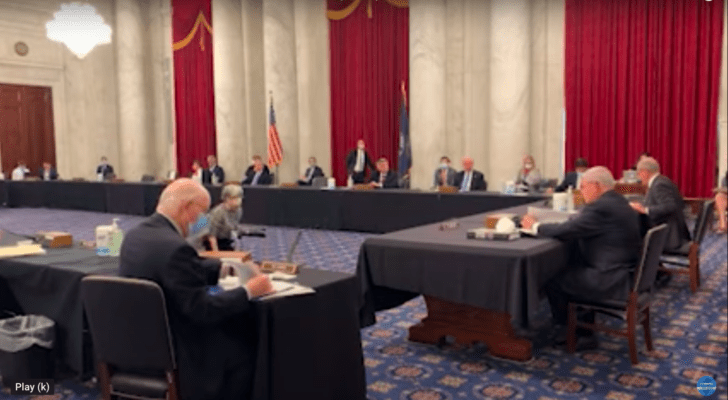Senate Foreign Relations Committee business meeting, May 21, 2020. (Screenshot from video of the meeting taken on an iphone by a staffer after Committee Chair Risch refused to permit a livestream of the meeting.)
The Foreign Relations Committee passed a bill on May 21st to give Israel a minimum of $38 billion over the next ten years, despite ongoing devastation to the US economy. The bill was passed in a meeting closed to Senate live-streaming in a voice vote on a group of 15 items. There was no discussion or debate of the bill – the largest such package in US history – and its title was never said… Now the bill will go to the full Senate. If it passes there, it will likely soon be signed into law, since the House has already passed a similar version…
By Alison Weir
The Senate Foreign Relations Committee secretively passed a bill yesterday to give Israel a minimum of $38 billion over the next ten years despite the ongoing devastation to the US economy by coronavirus policies.
The bill – S.3176 – will now go before the full Senate. Since the legislation has already been passed by the House of Representatives, if the Senate passes the bill, it will then go to the president to be signed into law.
UPDATE: For a detailed analysis of what the bill contains, see below.
To contact Congress about the bill, go here.
The bill was passed by the committee under two unusual circumstances and with almost no public awareness.
First, Senate Committee Chairman Jim Risch (R-Idaho) refused to allow a livestream of the meeting, despite the fact that the Senate Rules panel had recommended that extra efforts be taken to ensure public transparency while the Capitol is closed to the public and the presence of reporters is severely limited. The Senate’s Press Gallery Standing Committee of Correspondents had objected strongly to Risch’s decision.
Second, the bill was passed without being named, debated, or even discussed, even though it would set into law the largest such aid package in U.S. history. There has been no US mention of the bill by US mainstream media.
The massive package is particularly noteworthy in light of the current devastation to the American taxpayers who will be footing the bill – over $10 million per day. In recent months approximately 30 million Americans have lost jobs, 100,000 small businesses have already closed forever, and over seven million are at risk of doing so.
The bill was voted on as part of a package of 15 bills that were voted on “en bloc” (all together).
After Senator Kaine said he didn’t know what the list contained, Risch responded: “I’m not trying to pull anything here… this was circulated among the staff.”
Risch then rapidly listed the numbers, but did not give the titles. There was then a voice vote and the motion passed unanimously. (See video below.)
Democratic members of the committee had voiced strong objections to blocking a livestream of the meeting because of a different agenda item. After the meeting, Committee Ranking Member Robert Menendez (D-NJ) released a video of the meeting.
None, however, voiced any concern to giving a massive aid package to a country widely documented as a major violator of human rights.
Neither did any Democrats on the committee object to requiring American taxpayers to give Israel over $7,000 per minute when many Americans are suffering catastrophic financial difficulties.
Democratic committee members Menendez, Ben Cardin, Cory Booker, and Chris Coons, like many of the Republican members, are particularly known for being under the influence of AIPAC and the Israel lobby and receiving pro-Israel campaign donations. Many of the members are co-sponsors of the bill.
The bill, entitled “United States-Israel Security Assistance Authorization Act of 2020,” expands and sets into law a memorandum of understanding agreement signed by the Obama administration with Israel in 2016. This agreement is nonbinding and not required by law. It also set the $38 billion as a ceiling.
The legislation just passed by the committee would make this disbursal legally required, and, in addition, it would make the $38 billion a floor rather than a ceiling. In other words, the amount of money could legally go even higher.
Given the power of the pro-Israel lobby, combined with the fact that U.S. media are not informing Americans of this use of their tax money, the likelihood is that US money to Israel will go up in the future – possibly even this year.)
Most Americans say they feel the US is giving Israel too much money. Israel has received more US tax money than any other country – on average, about 7,000 times more per capita than others around the world.
The Council for the National Interest has posted a petition against this year’s installment, $3.8 billion. So far, it has been signed by close to 2,000 people.
The portion of the meeting that passed the bill:
The aid harms Americans
Israel and its advocates often claim that Israel is America’s “aircraft carrier” in the Middle East. However, it is actually American soldiers who have fought and died for Israel through the years.
Aid to Israel is also problematic for other reasons. Israel has a long record of human rights violations, as documented by Human Rights Watch, the Red Cross, Christian Aid, Amnesty International, Oxfam, and numerous other humanitarian agencies.
Israel has also used U.S. aid in ways that violate U.S. laws.
For these reasons, providing Israel with massive amounts of money and weaponry is antithetical to most Americans’ moral and ethical principles.
In addition, such aid creates dangerous hostility to the U.S. Bin Laden, for example, listed U.S. support for Israeli crimes as one of the major reasons for his opposition to the United States.
Israel is not an ally
Israel has a history of spying on the U.S, stealing American technology, and involving Americans in wars on its behalf.
Former CIA and military intelligence officer Philip Giraldi spoke of this in a speech at the National Press Club in 2014, but CNN, Fox News, PBS, NBC, etc. didn’t show it to Americans. (Video here.)
Similarly, former top CIA analyst Raymond McGovern described Israel’s involvement in pushing the U.S. into tragic and unnecessary wars. (Video here.) Again, this information did not make it into mainstream American media coverage. (McGovern was an extremely high level official. He served as a CIA analyst for 27 years, from the administration of John F. Kennedy to that of George H. W. Bush. His duties included chairing National Intelligence Estimates and preparing the President’s Daily Brief, which he briefed one-on-one to President Ronald Reagan’s five most senior national security advisers from 1981 to 1985. He received the Intelligence Commendation Medal at his retirement.)
Israel attacked USS Liberty
In addition, Israel tried to sink a U.S. Navy ship in an action that four-star Admiral Thomas Moorer called “an act of war against the United States.”
Admiral Moorer reported on his commission’s investigation into the attack in a public briefing on Capitol Hill in 2003, but almost no U.S. media reported the findings, among them:
That there is compelling evidence that Israel’s attack was a deliberate attempt to destroy an American ship and kill her entire crew; evidence of such intent is supported by statements from Secretary of State Dean Rusk, Undersecretary of State George Ball, former CIA director Richard Helms, former NSA directors Lieutenant General William Odom, USA (Ret.), Admiral Bobby Ray Inman, USN (Ret.), and Marshal Carter; former NSA deputy directors Oliver Kirby and Major General John Morrison, USAF (Ret.); and former Ambassador Dwight Porter, U.S. Ambassador to Lebanon in 1967
NASA
The bill also requires NASA to work with the Israel Space Agency, despite accusations of Israeli espionage. In 2015 a Caltech scientist revealed that the Chair of Israel’s National Committee for Space Research had illegally acquired classified information. The alleged espionage and theft largely took place at Caltech’s Jet Propulsion Laboratory, a top NASA research and development center.
Alison Weir is executive director of If Americans Knew, president of the Council for the National Interest, and author of Against Our Better Judgment: The Hidden History of How the U.S. Was Used to Create Israel. (An Addendum with more information about the aid was added to the original article, and another addendum with a detailed description by Lara Friedman of what the bill contains.)
What does the bill do?
Senate Foreign Relations Committee Amends/Passes S.3176, Israel Wish-List Bill
By Lara Friedman, reposted from Foundation for Middle East Peace
On 5/21, the Senate Foreign Relations Committee held a “business meeting.” On the agenda were 21 pieces of legislation (most with amendments to be considered by the committee) – including the nomination of Michael Pack to be the CEO of the Broadcasting Board of Governors. Among the bills on the agenda was S. 3176 – the United States-Israel Security Assistance Authorization Act of 2020. And like many bills on the agenda, S. 3176 was to be considered with a managers’ amendment.
Last year, when the House version of this legislation was brought up first in the House Foreign Affairs Committee and then on the House floor, the measure — which authorizes not only $3.8 billion in funding for Israel for the life of the current MOU, but also millions in new funding for various programs, plus other goodies — was adopted with zero discussion/debate. Yesterday, the SFRC followed suit, adopting S. 3176 without even bothering with a pretense of public discussion/consideration. This lack of transparency is especially egregious because the managers’ amendment to S. 3176 was an amendment in the nature of a substitute (as in, the amendment that deleted the entire text of the original bill and replaced it with new text), and even more egregious because that amendment **WAS NOT MADE PUBLIC UNTIL LONG AFTER THE HEARING ENDED.**
So how did it go down? Literally the entire SFRC business meeting was consumed by contentious consideration of Pack’s nomination — at the conclusion of which, the Chairman noted that time was running out and moved 15 bills “that have been agreed to” – including S. 3176 and its amendment – en bloc. Following some expressions of unhappiness by Menendez (D-NJ) over bills not included in the bloc, the Committee adopted the en bloc bills (with their amendments) by Voice Vote (video of this charade of committee oversight is here).
What happens next?
This week’s actions paves the way for pro-Israel S. 3176 to be brought to the Senate floor, where it will almost certainly be adopted without debate (except perhaps an effort to amend it to add more goodies for Israel). The Senate can then either send S. 3176 to the House or, more likely, it can take up the House-passed version HR 1837 (which the House sent to the Senate back on 7/24/19), amend it to replace the House text with S. 3176, and send it back to the House for action.
Either way, the House and Senate versions of the bill are different enough that further action is required before this legislations goes to the President.
What are the key things to know about S. 3176, the US-Israel Security Assistance Authorization Act of 2020?
Some key points before getting into the details of the bill:
- Codifying into law annual US aid to Israel – both the amount and the manner in which it is disbursed – in a manner to prevent any future Administration or Congress from having the ability to use that aid as leverage, and to make clear that the only changes in US aid to Israel that Congress will contemplate are changes that increase aid beyond the level negotiate in the current MOU [Memorandum of Understanding].
- Increasing U.S. military support for and cooperation with Israel, and facilitating additional, new military aid support.
- Establishing and authorizing funding for programs designed to make enhanced/expanded US-Israel cooperation part of the DNA of more and more U.S. government agencies.
- Establishing programs that in effect recruit U.S. agencies/funding to the cause of expanding Israel’s relations and influence in the region (i.e., open normalization by Arab states) and around the world.
Third, as noted in last week’s Round-Up, the timing of this bill – coming up now – is significant. This legislation represents a veritable “everything Israel could ask for” gift from Congress. Assuming it goes ahead (which is a near certainty), it will be yet another signal from Congress that not only will there be no consequences for annexation (or, indeed, anything Israel does in any conceivable context), but that Congress will continue to seek every opportunity to find new way to reward Israel.
What – specifically – is in pro-Israel S. 3176?
Below is a detailed look at the provisions of S. 3176 (as amended in committee).
Title I – Security Assistance to Israel
Section 103: Amends U.S. law by legislating annual security assistance for Israel under the MOU. Also makes explicit that the aid amount stipulated under the MOU is a floor, not a ceiling (changes “equal to” to “not less than”). Also legislates early disbursal of full amount. (Similar to Section 205 of the House bill)
Section 104: Extends authority for the War Reserves Stockpile through 2025, and authorizes annual increases of up to $200 million for 2021-2025, for a total increase of $1 billion.
Section 105: Extends existing loan guarantees to Israel through 2025.
Section 106: Authorizes transfer to Israel of precision guided munitions from U.S. reserve stocks “in such quantities as necessary for legitimate self-defense of Israel and is otherwise consistent with the purposes and conditions for such transfers under the Arms Export Control Act.” For such transfers, requires a certification to Congress — “Except in the case of an emergency as determined by the President” — that such transfer doesn’t undermine U.S. military readiness, is “necessary for Israel to counter the threat of rockets in a timely fashion,” and “is in the national security interest of the United States.” (Similar to Section 207 of the House bill)
Section 107: Expressing Sense of Congress that the President “should (1) prescribe procedures for the rapid acquisition and deployment of precision guided munitions for United States counterterrorism missions, or(2) to assist an ally of the United States, including Israel, that is subject to direct missile threat.” (Similar to Section 208 of the House bill)
Section 108: Pushes for Israel to be included “in the list of countries eligible for the strategic trade authorization exception under section 740.20 (c) (1) of title 15, Code of Federal Regulations section…” [which pertains to “exports, reexports, and transfers (in-country) in which the only applicable reason(s) for control is (are) national security (NS); chemical or biological weapons (CB); nuclear nonproliferation (NP); regional stability (RS); crime control (CC), and/or significant items (SI) are authorized for destinations in or nationals of Country Group A:5]“] (Similar to Section 210 of the House bill)
Title II – Enhanced United States-Israel Cooperation
Section 201: Authorizes the Secretary of State Department to enter into an MOU with Israel for the purposes of ensuring US-Israel cooperation to advance common goals in third countries and in various sectors, (including energy, agriculture and food security, democracy, human rights, governance, economic growth, trade, education, environment, global health, water and sanitation). (Similar to Section 106 of the House bill)
Section 202: Authorizes $2 million each year from 2020-2024 ($10 million total) “to finance cooperative projects among the United States, Israel, and developing countries that identify and support local solutions to address sustainability challenges relating to water resources, agriculture, and energy storage…”(Similar to Section 107 of the House bill)
Section 203: Authorizes the Secretary of State to establish a program to “help foster cooperation in the Middle East region by financing and, as appropriate, cooperating in, projects related to innovation and advanced technologies” with the goal of such projects – which each must involve an Israeli partner – being to “contribute to the development and the quality of life in the Middle East region through the application of research and advanced technology” and to “contribute to Arab-Israeli cooperation by establishing strong working relationships that last beyond the life of such projects.” [This would be, in effect, a USAID program incentivize/coerce Arab countries into open normalization with Israel] (Similar to Section 108 of the House bill)
Section 204: Expressing the Sense of Congress regarding the value of US-Israel economic cooperation, including on science and technology innovations, and stating that the President should “regularize and expand existing forums of economic dialogue with Israel and foster both public and private sector participation.” (Similar to Section 110 of the House bill)
Section 205: Authorizes US-Israel cooperation on directed energy capabilities; authorizes financial support for specified activities under such cooperation; mandates additional reporting to Congress. (Similar to Section 102 of the House bill)
Section 206: Requires the President to establish and update, as appropriate, contingency plans to provide Israel with defense articles and services that are determined by the Secretary of Defense to be necessary for the defense of Israel and to brief Congress on these plans. (Similar to Section 203 of the House bill)
Sec 207: Grab bag of other goodies building Israel-related programs into a range of US agencies and on a range of issues. (Similar to Section 110 of the House bill)
-
- HHS: Authorizes $4 million a year from 2021-2023 ($12 million total) to the Department of Health and Human Services for “a bilateral cooperative program with the Government of Israel that awards grants for the development of health technologies…” [House version authorizes $2 million annually for 2020-2022 ($6 million total)] NOTE: This is, in effect, the Cruz (R-TX)/Coons (D-DE) legislation introduce 5/13 –S. 3722; Cruz tweet crowing about getting the bill included in S. 3176 is here]
- DOS/science & technology: Authorizes the President to designate a State Department official to act as “Coordinator of United States-Israel Research and Development” to oversee civilian science and technology programs “on a joint basis with Israel”
- FDA: Expresses sense of Congress that the Commissioner of the US Food and Drug Administration “should explore collaboration with Israel through the Office of Global Policy & Strategy” and requires a report to Congress from that office “describing the benefits to the United States and to Israel of opening an office in Israel for the Office of Global Policy and Strategy…”
- DOE: Authorizes $4 million a year for 2021-2023 ($12 million total) to the Department of Energy “to carry out the activities of the United States-Israel Energy Center established pursuant to section 917(d) of the Energy Independence and Security Act of 2007”;
- BIRD: Expresses sense of Congress that “grants to promote covered energy projects conducted by or in conjunction with the United States-Israel Binational Industrial Research and Development Foundation should continue to be funded at not less than $2,000,000 annually…”
- DHS: Authorizes $2 million a year for 2021-2023 ($6 million total) for U.S.-Israel cooperation on energy, water, homeland security, agriculture, and alternative fuel technologies via the Department of Homeland Security (DHS is not mentioned in the bill, but the section of law amended by this provision deals with DHS programs).].
- DOT: Calls for an annual US-Israel dialogue “to implement the 2016 Memorandum of Cooperation signed by the Secretary of Transportation and the Israeli Minister of Transportation”
- NASA: States that the NASA Administrator “shall” continue work with the Israel Space Agency “to identify and cooperatively pursue peaceful space exploration and science initiatives in areas of mutual interest, taking all appropriate measures to protect sensitive information, intellectual property, trade secrets, and economic interests of the United States”
- OSTP: Requires a report to Congress from the White House’s Office of Science Technology Policy on “research and development cooperation with international partners, such as the State of Israel, in the area of desalination technology…”
- VA: Expresses sense of Congress that the Secretary of Veterans Affairs should “explore collaboration between the Mental Illness Research, Education and Clinical Centers of Excellence and Israeli institutions with expertise in researching and treating post-traumatic stress disorder.”
Lara Friedman is the President of the Foundation for Middle East Peace (FMEP). She is a Contributing Writer at Jewish Currents and a non-resident fellow at the U.S./Middle East Project (USMEP). Prior to joining FMEP, she was the Director of Policy and Government Relations at Americans for Peace Now (an Israeli organization), and before that she was a U.S. Foreign Service Officer, serving in Jerusalem, Washington, Tunis and Beirut.
RELATED:
Israel may ask for double its usual $3.8 billion from the U.S this year
Despite coronavirus-caused cutbacks, Israel expects to get full $3.8 billion
The Staggering Cost of Israel to Americans
Human rights reports on Israel-Palestine
Air attacks: Gazan rockets and Israeli airstrikes
Leahy Law would cut aid to Israel, but no one wants to enforce it
Lawsuit Warns $234 Billion In Aid To Israel Violates US Law Against Supporting Secret Nuclear States





